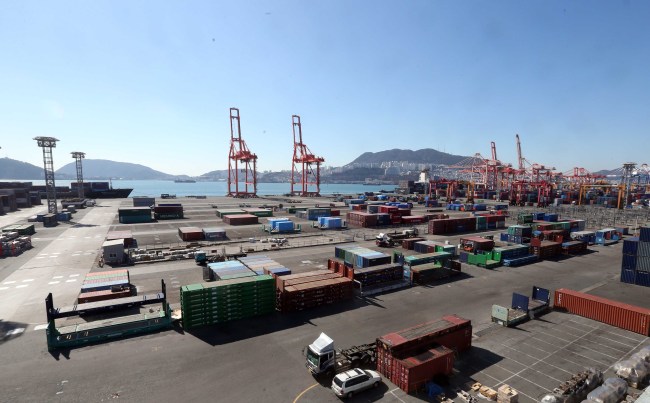South Korea’s outbound shipments are expected to fall by up to 0.5 percent in 2016 from a year ago amid tepid global demand, a report showed Sunday.
 |
(Yonhap) |
“Sluggish global demand, and weaker European and Japanese currencies will drag down the nation’s exports by 0.4 to 0.5 percent in 2016 compared to 2015,” said the report compiled by the Export-Import Bank of Korea.
The report underlined the increasing uncertainties of the Chinese economy and the impact of the U.S. interest rate hike as key factors that could take a toll on the global economy and Korea’s exports.
“Shipments to China, the nation’s biggest export market, will remain tepid as the world’s second-largest economy is cooling down,” it said.
Exports to other emerging economies in the Middle East, Russia and Brazil are forecast to slump as the commodity-rich countries are likely to be stuck in the doldrums due to oversupply of oil, nonferrous metals and food items, according to the report.
Shipments from Korea totaled $526.9 billion in 2015, down nearly 8 percent from a year ago as global markets slumbered. But its share in world trade grew by 0.11 percentage point to 3.46 percent, pushing the country one notch up to sixth, its highest level in the World Trade Organization rankings, according to a separate report last week.
Korea Eximbank’s exports projection is in line with the Bank of Korea’s outlook of a 0.4 percent drop in outbound shipments but much lower than the 2.1 percent rebound predicted by the Ministry of Strategy and Finance.
Exports plummeted 18.8 percent in January from a year earlier, the largest year-on-year drop in 6 1/2 years, extending their losing streak to 13 months.
The slowdown in China, the country’s biggest trade partner, will cause an “inevitable export slump” in Korea given that some 75 percent of sales to China are intermediate goods while finished consumer goods take up a small share, according to Kim Yoon-ji, a senior researcher at the bank.
By sectors, electronic equipment and machinery will be hit hard by shrinking Chinese demand while cosmetics, food and beverage are expected to benefit as Chinese policy makers seek to spur domestic spending.
The bank expected that the U.S. central bank will raise rates four times this year, which will boost Korea’s exports to the U.S. But, in general, the rate hikes will cause Korea to struggle with a drop in exports to emerging markets.
“There are downside pressures. Additional U.S. interest rate hikes could stir up financial instability in the world. China may fall into a recession, and commodity prices will remain weak,” the report said.
By Park Han-na (
hnpark@heraldcorp.com)




![[Herald Interview] 'Trump will use tariffs as first line of defense for American manufacturing'](http://res.heraldm.com/phpwas/restmb_idxmake.php?idx=644&simg=/content/image/2024/11/26/20241126050017_0.jpg)

![[Health and care] Getting cancer young: Why cancer isn’t just an older person’s battle](http://res.heraldm.com/phpwas/restmb_idxmake.php?idx=644&simg=/content/image/2024/11/26/20241126050043_0.jpg)

